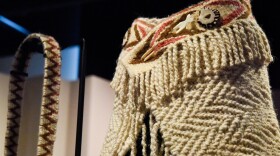It's a big weekend for the Seattle Men’s and Women’s choruses, performing Friday for President Barack Obama, and tonight and tomorrow for the public, at McCaw Hall in Seattle, in a musical farewell to their retiring director. Over 35 years, Dennis Coleman has been in front of not only the two choruses, but also some of the biggest changes in LGBT history.
This story begins in 1981.
“I was 31 years old, working full time in church music, and came out as a gay man,” Coleman said. “It was at odds with the denomination I was serving in.”
That Southern Baptist church fired him. Within days, he started talking with the Seattle Men’s Chorus, a new group of gay men who had just started singing together. The group had just started – in 1979 – and hadn’t been able to keep a director. Coleman was their fourth.
He remembers his first rehearsal.
“I was scared to death. I couldn’t even see their faces. For me it was just a big old haze,” he said. “I didn’t know any gay people prior to this.”

So, in many ways, the chorus gave Coleman a safe place to deepen his own sense of who he was.
Others, though, grew up with the chorus quite literally. Jeffrey Erickson joined in 2005, but as a kid, he’d been in the audience for YEARS, with his grandmother.
“Dennis has changed the arts community in Seattle, profoundly, beyond just our city,” Erickson said. “I think his vision is not just to have an impact here in Seattle, but to have it ripple.”
The Seattle Men’s Chorus was established in 1979. The Seattle Women’s Chorus was established in 2002. Both identify as LGBT organizations, but you’ll notice the words “gay” and “lesbian,” are missing from their titles. Coleman says that’s on purpose.
“We didn’t want to make it seem like the only people who could come to see a gay chorus, were gay people,” he said. “And the wonderful thing is that today we have quite a few straight men.”
Like Dan Boughner. He learned about the chorus after his wife went to see a concert. He quickly joined.
“It’s taught me a tremendous amount,” Boughner said. “It’s taught me what it means to be a man, very frankly.”
Boughner joined in 2009. He remembers that first season, and how he and some chorus members wandered over to a same-sex marriage rally during a break in rehearsal.
“And people tried to hand me stuff, and I didn’t want anything,” he said. “I didn’t understand how homophobic I was. I listened to people talking about how they wanted to marry who they chose. And I said, ‘This makes so much sense.’ The greatest truths are the simplest truths. I joined the chorus to sing. But suddenly it was a mission.”
The passage of same-sex marriage nationwide was one of a number of big events in LGBT history to take place during Coleman’s 35-year tenure as director of the choruses. And the chorus continues to be a voice for LGBT issues and causes. Earlier this month they sang at a vigil for victims of the Orlando massacre. Back in the late '80s and early '90s, they were dealing with the AIDS crisis.

“Sometimes we would sing several times a month at a funeral for one of our members,” Coleman said. “We tried to sing at any service we were asked to sing at. At that point the chorus’s mission shifted to being more of a mental health organization for its members and the audience. We were the one place you could still come in those days, where a lot of people from the gay community could gather together in a room, cry together, laugh together, hear stories, and continue to fight on.”
The concert this weekend is called “Encore!” and features a variety of music spanning Coleman’s time as director. Coleman says he’ll miss the chorus, but that deciding to retire wasn’t that difficult. He’ll have less stress from rehearsal schedules and concert deadlines, and more time to travel. And he’ll still be active with his church choir.
And then?
“We’ll see,” he said. “Just like I don’t have a clue what the chorus is going to be doing in five years, I have no clue what I’m going to be doing in one year. I never have been good at long-range planning.”
Coleman’s final concerts as director of the Seattle Men’s and Women’s choruses happen Friday and Saturday at McCaw Hall in Seattle. The incoming artistic director, Paul Caldwell, conducts his first concert in October.
Coleman says he looks forward to what Caldwell will do with the groups, and is excited to take his final bows.
--
Dennis Coleman will also be a grand marshal of this year's Seattle Pride Parade, on Sunday, June 26. The interview we conducted with Coleman at his home in Seattle was much too long to broadcast in its entirety. Below, find an extended version, featuring more conversation about growing up in rural Oregon, coming out as gay, losing a companion to AIDS, and how the chorus' role changed over the years.










